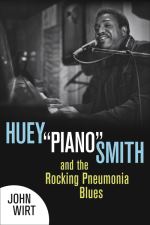
Simply put, Huey “Piano” Smith is one of the great heroes of New Orleans and American music. As that generation ages and goes on to greener pastures, it’s important and necessary to acknowledge and praise these folks before they and the unique history that they embody are gone.
John Wirt’s extensive biography of Smith certainly gives him his due. Wirt starts from Smith’s beginning and traces his life path in a thorough fashion through his fame playing with the Clowns, the assorted record labels Smith recorded for, his conversion to the Jehovah’s Witness faith, his move to Baton Rouge, and all the way up the present day.
Besides interviews with Smith, Wirt’s book has interviews with both Smith’s well-known and more-obscure peers, including Earl King, Dr. John, Gerri Hall, Bobby Marchan, Deacon John and others, all of whom give colorful quotes and insightful explanations of what Smith was like and what it was like to hear him and make music with him.
Wirt places Smith in his rightful place in the pantheon with great descriptions of both the music and the scene that was full of creativity and wildness for which the golden age of New Orleans rhythm and blues has become both famous and notorious. Wirt’s research is excellent; he is great with the music history and the legal history of Smith’s series of lawsuits to get back and retain the rights to his songs.
Wirt’s focus during the second half of the book on the legal shenanigans and court cases can get a little dry but all of it illustrates textbook cases of how New Orleans musicians got screwed out of their money and song rights. One of the reasons that good rock and roll sounds the way it does is because of Huey “Piano” Smith’s musicianship and personality.
John Wirt’s biography explains why.




